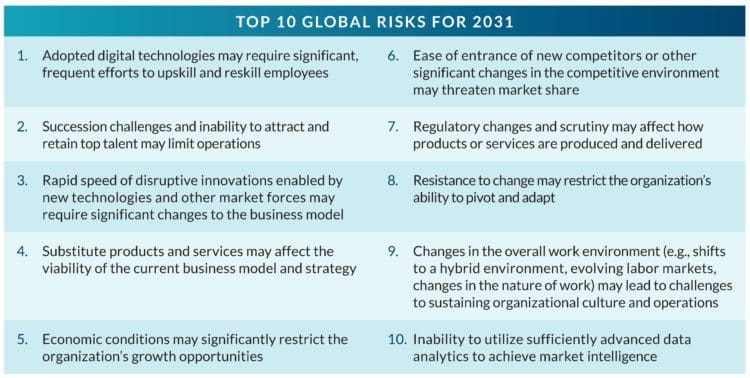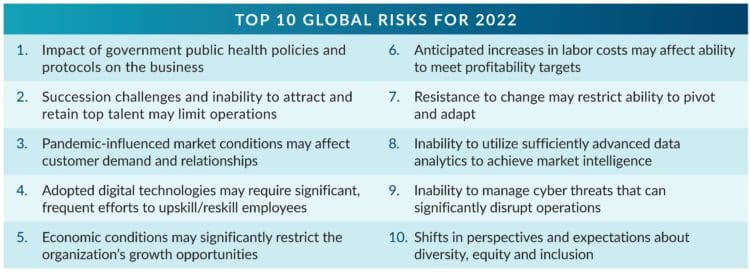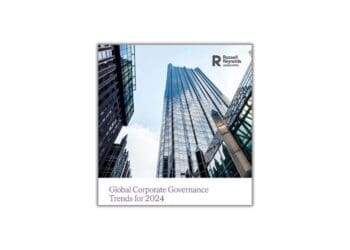According to a recent global survey, company leaders and directors predict a disruptive decade lies ahead. That is why organizational resiliency is the game successful companies play to win. Those that manage to adapt and remain agile, while maintaining culture and core principles, will hold an edge on competition over the next 10 years.
Protiviti and NC State University’s ERM Initiative conducted a global survey in September and October 2021 to capture perspectives on 36 risks on the minds of directors, CEOs and other C-level executives as they looked into 2022 and over the next 10 years. The 1,453 participating respondents were also asked to offer other perspectives on the risk landscape and their organization’s risk management capabilities.
Our survey approach asked the participants to rate the potential impact of 36 specific risks across three dimensions – macroeconomic, strategic and operational – using a 10-point scale, where “1” meant “no impact at all” and “10” meant “extensive impact.” Based on the mean average scores, we ranked the risks using two time horizons – over the next 12 months, meaning 2022, and over the next 10 years, through 2031. The survey results were reported on an overall basis and broken down by organization size and type, executive position, industry grouping and geographic location.
Accompanying this article are two lists from the study: the overall top 10 risks for both 2022 and 2031 presented on a global basis.
 Buckle Up
Buckle Up
When we think of “buckle up,” the context is usually the passenger seat of a car. But the context here is about the ups and downs of a roller coaster ride. The risk landscape is not only volatile, the scope of global top risks has become more expansive. The spread between the top risk and, say, the 15th-rated risk over the next 12 months has narrowed considerably compared to prior years. The scope of risk concerns for the next 10 years pertains to the future of work and the workplace; talent acquisition, retention and succession; disruptive innovation, new competitors and sustaining customer loyalty; the economy; regulatory change; utilizing sufficiently advanced data analytics and “big data”; and data privacy and cybersecurity. Looming large on the radar is organizational culture, including the impact of workplace evolution and the inhibiting influence of resistance to change over both the near and long term.
Human capital challenges abound in both our near-term and long-term top risk outlooks, giving the ‘S’ of environmental, social and governance (ESG) considerations a hearty role to play in our study as labor markets and the workplace undergo change. The focus on innovation and digital transformation to retain relevance has never been stronger. The economy is now a long-term concern, whereas it was not a top 10 risk last year looking out 10 years.
Bottom line, there is a lot on the plate as the risk landscape portends a disruptive decade ahead. Near-term concerns over restrictive pandemic public health protocols linger, but the rating for these matters reflects the largest year-over-year decline globally. Cybersecurity, data privacy and regulatory matters also reflect declines but remain top-of-mind concerns.
What About Climate Issues?
Overall, the “E” of ESG is quite evident on the horizon, as climate change concerns represent one of the five risks reflecting the largest increases in severity between years. Oil and gas and power companies generating energy utilizing fossil fuels rate climate concerns as a top risk. Our respondents across the globe representing companies in other industry groups, however, do not perceive significant alterations in their strategy and business model in response to climate change as a long-term concern. That is the perception now in these industries.
In time, though, investor expectations, customer preferences, regulatory requirements and other market developments could change that perception. Trends in the investor community bear watching in this regard. Sustainable investments driven by the screening criteria of institutional investors and asset managers are on track to represent more than a third of the projected total assets under management by 2025. As the influence of millennials increases in the market, so do consumer preferences for doing business with companies committed to the well-being of the environment. Thus, a lack of focus on climate matters could pose additional talent retention challenges, especially with respect to younger generations.
In our survey, we also invited respondents to answer an open-ended question, soliciting their opinions about additional emerging risk issues specific to their organization that would impact them a decade from now. Specifically, we asked:
Looking ahead 10 years, are there additional emerging risk areas specific to your organization that we have not addressed? If so, please list any other emerging risk issues (such as extreme but plausible events you envision) significantly affecting your organization that were not captured in the prior questions.
Over 325 participants responded in multiple languages. The exercise gave them the opportunity to express in their own words what was top of mind for them as they looked out 10 years. Interestingly, “climate” and “change” were mentioned the most. Other notable words include “government,” “technology,” “development,” “geopolitical” and China.” Last year, the word “pandemic” was prominent, but it was not this year.
In summary, our survey indicates that climate change is an important matter to a lot of people. But outside of fossil fuels-based industries, the current perception of many survey respondents is that climate issues will not significantly impact their organization’s strategy and business model.
Resiliency Is the Key to Success
In an environment of rapid disruptive change, there are several keys to success implicit in our survey results. All of them support a vital differentiating skill – organizational resiliency.
First, it is important to review strategies, policies and operations periodically. Because they cannot control the business environment in which they operate, companies should be able to pivot to the unexpected. That means being prepared. It means reality testing strategies against multiple “extreme but plausible” events that could invalidate critical assumptions underlying the strategy. It means being decisive when it is evident the business model requires adjustment or there is internal dysfunction necessitating immediate attention.
Winners over the next decade will access the best and brightest talent and the skills they need to execute their strategies. This won’t be easy. Job openings may be plentiful, but individuals with the requisite qualifications and skills are not walking the streets. This challenge is exacerbated as highly skilled workers with institutional knowledge of the business retire. Our survey results point to new technologies requiring companies to upskill and reskill existing employees, which means the most successful companies will make this critical activity a strategic imperative. The so-called Great Resignation phenomenon is another contributing factor, requiring companies to focus on inculcating a trust-based, collaborative culture, emphasizing diversity and inclusion, engaging in strategic communications, and offering the flexibility and benefits that engender employee loyalty.
Winners will also be more agile. Expect these companies to excel at obtaining and analyzing market intelligence by deploying sufficiently advanced data analytics and mastering the “big data” problem, giving decision makers actionable insights to understand and anticipate customer needs and spawn the productivity and innovation initiatives that will enhance the customer experience continuously. Expect them to augment their near-term awareness with a longer-term perspective. Thinking long-term about enterprise opportunities and risks can impact resiliency and preparedness for the next decade. It can reveal a number of different challenges than those that may be emerging short-term. And it can facilitate the creation of a focused dashboard of regularly reported lead metrics to the executive team and board of directors.
Finally, the winners over the next decade will be the ones that act with intention at the speed of the market or upon the onset of disruptive events. Expect them to assess the company’s strategy periodically with a comprehensive forward-looking point of view linked to critical strategic assumptions and risks. Expect them to monitor strategic execution and deploy actionable early warning capabilities to inform management timely of new market developments and emerging risks. Finally, expect them to emphasize the importance of making high-velocity, high-quality decisions by keeping decision-making processes free of bureaucratic nuances.
When the stories are written in 10 years about the most successful companies over the previous decade, these are likely to be the attributes of the innovative cultures that enabled them to compete and win.




 Jim DeLoach, a founding
Jim DeLoach, a founding 






